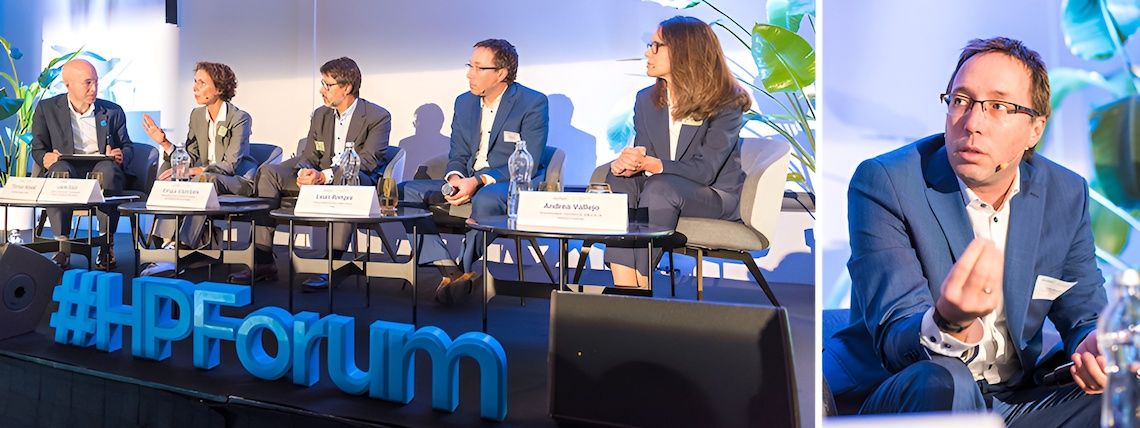Ako môžu tepelné čerpadlá urýchliť globálny prechod na nízkouhlíkové hospodárstvo
Louis Rompre, Trane Commercial HVAC EMEA-ANZ, zastupuje spoločnosť Trane Technologies v panelovej diskusii na Európskom fóre tepelných čerpadiel 2023, ktoré sa uskutoční 27. septembra.
Európske fórum tepelných čerpadiel je každoročné podujatie, ktorého cieľom je spojiť myšlienkových lídrov, tvorcov politík, priemyselných gigantov a vplyvné zainteresované strany s cieľom podeliť sa o odborné znalosti, inovácie, diskutovať o riešeniach a podporiť netradičné myslenie. Stalo sa dôležitým stretnutím, ktoré spája priemyselné odvetvie smerom k spoločnému cieľu: rozšíreniu úlohy technológií tepelných čerpadiel v našej spoločnosti.
Louis Rompre, vedúci portfólia Unitary EMEA-ANZ, sa zúčastnil na okrúhlom stole s názvom "Úloha tepelných čerpadiel pri globálnom prechode na nízkouhlíkové hospodárstvo", kde sa podelil o myšlienky, prečo musíme pokračovať v inováciách a posúvať hranice v oblastiach, ako sú chladivá, konkurencieschopnosť, účinnosť, technológie, riadenie energie, tepelné systémy a spätné získavanie tepla. Sála bola plná a diskusia bohatá.
"Ako priemysel musíme lepšie ukázať, čo dokážeme urobiť dnes v snahe o splnenie globálnej energetickej výzvy. Mnohé z toho, čo by sa mohlo považovať za technológiu budúcnosti, je už tu. " povedal Louis.
Pokrok REPowerEU v "HeatBeat": Akcelerátor tepelných čerpadiel
Trane Technologies vedie diskusiu o výhodách využívania systémov tepelného hospodárstva na dekarbonizáciu budov a miest pomocou obnoviteľnej elektrickej energie získanej spätným získavaním energie z chladenia a vykurovania.
Ako povedal Louis: "Pokiaľ ide o dekarbonizáciu, elektrifikácia vykurovania je ďalšou veľkou hranicou. Nahradenie vykurovacích systémov na báze fosílnych palív účinnými, plne elektrickými technológiami výrazne zníži spotrebu energie v budovách. Tepelné čerpadlá môžu už dnes priniesť veľké zmeny. Ako odvetvie potrebujeme "podporu" trhu, ako aj podporu vlády, aby sme urýchlili prechod na tepelné čerpadlá."
A práve o to ide v pláne Európskej komisie REPowerEU. Stanovil ambiciózne ciele a požaduje zdvojnásobenie počtu novoinštalovaných tepelných čerpadiel ročne. EHPA odhaduje, že do roku 2026 pribudne 20 miliónov tepelných čerpadiel a do roku 2030 60 miliónov, čím sa prekoná súčasný počet 17 miliónov jednotiek. Na dosiahnutie týchto cieľov Európska komisia pripravuje akčný plán pre tepelné čerpadlá, ktorého vydanie je naplánované na koniec roka 2023.
Podľa komisárky pre energetiku Kadri Simsonovej sú tepelné čerpadlá súčasťou trvalého plánu na zavedenie čistejších, ekologickejších a na budúcnosť odolnejších energetických systémov. "Akčný plán pre tepelné čerpadlá bude zverejnený až "po prijatí smernice o energetickej účinnosti budov", pretože práve "v tomto rámci" "chceme urýchliť rozšírenie tepelných čerpadiel a položiť základy pre to, aby sa tepelné čerpadlá postupne stali novým kotlom".
Argumenty pre tepelné čerpadlá*
Vedci, inžinieri, politici a odborníci z priemyslu považujú tepelné čerpadlá za kľúčové riešenie klimatickej krízy a energetickej krízy.
Rýchle rozšírenie tepelných čerpadiel by znížilo závislosť Európy od dovozu energie zo zahraničia tým, že by sa do roku 2030 znížil dopyt po plyne v budovách o 40 % v porovnaní s rokom 2022 a v tom istom období by sa znížili náklady EÚ na dovoz energie o 60 miliárd EUR.
Tepelné čerpadlá takisto šetria značné množstvo skleníkových plynov. Dvadsať miliónov tepelných čerpadiel inštalovaných v Európe dnes znamená o 54 miliónov ton skleníkových plynov v atmosfére menej, čo sa približne rovná ročným emisiám Grécka.
Spaľovaním fosílnych palív a biomasy na vykurovanie sa uvoľňuje nielen oxid uhličitý, ale aj ďalšie látky znečisťujúce ovzdušie, ktoré poškodzujú zdravie ľudí. Tepelné čerpadlá v mieste svojej prevádzky nevypúšťajú látky znečisťujúce ovzdušie - ich väčšie nasadenie zníži emisie oxidu dusičitého v celej EÚ do roku 2030 o takmer 40 % v porovnaní s rokom 2022.
Tepelné čerpadlá sú pre spotrebiteľov nákladovo konkurencieschopnou možnosťou , keďže ich prevádzka je v EÚ počas celej životnosti v priemere o 30 % lacnejšia ako prevádzka plynového kotla.
Vedúca poz ícia
Spoločnosť Trane je naďalej lídrom. Na dôkaz nášho pokroku sme v súťaži Heat Pump Award predložili štyri rôzne efektívne, inteligentné a udržateľné projekty tepelných čerpadiel vrátane projektu Annecy Lake vo Francúzsku.
Vďaka vodnej slučke zásobuje jazero Annecy vo Francúzsku teplom a teplou úžitkovou vodou 570 domov v okrese Trésums a chladí 4* hotel Le Pélican spoločnosti PVG Group. Zdroj jazera nahrádza plyn 65 % obnoviteľnej energie a rekuperáciou. Tri tepelné čerpadlá Trane RTWF, ktoré sú srdcom systému, sú úplne disimulované pod zemou, aby sa nezmenila prírodná krása lokality.
Spoločnosť Trane ponúka portfólio riešení na podporu prechodu na elektrickú energiu. Navrhujeme elektrické systémy HVAC výberom zariadení a komponentov, ktoré majú zmysel pre každú aplikáciu. Tepelné čerpadlá sú kľúčovým faktorom umožňujúcim dekarbonizáciu. Naše systémy tepelných čerpadiel namiesto výroby tepla presúvajú teplo z jedného miesta na druhé - pozrieme sa na teplo v záťaži vašej budovy alebo v záťaži procesného chladenia, na vonkajší vzduch, odpadovú vodu alebo zdroje úpravy vody a identifikujeme pre vás ten správny zdroj tepla. Na základe toho dokážeme nakonfigurovať systémy tak, aby spĺňali požiadavky na teplotu, prietoky a redundanciu pre celoročné vykurovanie a chladenie - v širokom spektre klimatických prostredí.
"Robíme zmeny a naše úspechy stále rastú," povedal Louis. "Sme hrdí na to, že máme v tomto odvetví silný hlas a povzbudzujeme ostatných, aby sa pridali k spoločnosti Trane Technologies pri napredovaní nášho úsilia o dekarbonizáciu."
* Výňatok z publikácie "Heat Pump Accelerator". Publikáciu odovzdali 6. júna koordinátori iniciatívy, Európska asociácia tepelných čerpadiel a Európska klimatická nadácia, komisárovi EÚ pre energetiku Kadrimu Simsonovi.
Viac informácií o tepelných čerpadlách Trane
Stiahnite si publikáciu EU-Heat-Pump-Accelerator

Kontaktujte nás
Spojte sa s miestnym odborníkom spoločnosti Trane
Pomôžeme vám nájsť potrebné riešenie

